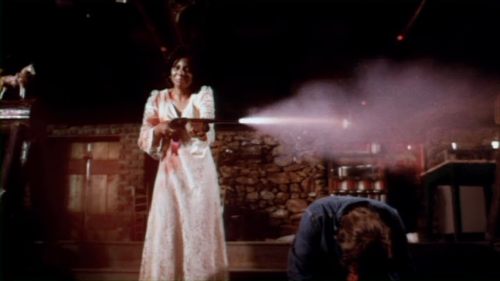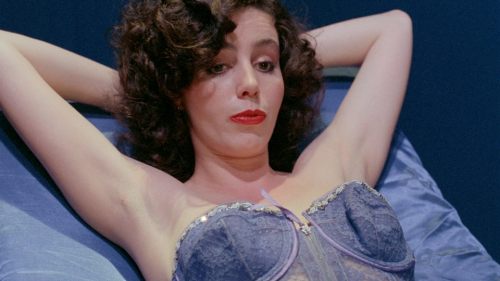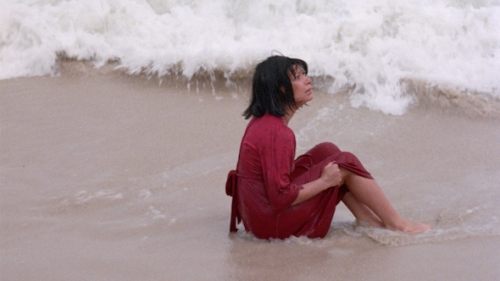The Savage Stack: HANDGUN (1984)
There’s always going to be – for lack of a better term – a stack of films we’ve been meaning to get to. Whether it’s a pile of DVDs and Blu-rays haphazardly amassed atop our television stands, or a seemingly endless digital queue on our respective streaming accounts, there’s simply more movies than time to watch them. This column is here to make that problem worse. Ostensibly an extension of Everybody’s Into Weirdness (may that series rest in peace), The Savage Stack is a compilation of the odd and magnificent motion pictures you probably should be watching instead of popping in The Avengers for the 2,000th time. Not that there’s anything wrong with filmic “comfort food” (God knows we all have titles we frequently return to when we crave that warm and fuzzy feeling), but if you love movies, you should never stop searching for the next title that’s going to make your “To Watch” list that much more insurmountable. Some will be favorites, others oddities, with esoteric eccentricities thrown in for good measure. All in all, a mountain of movies to conquer.
The fourth entry into this unbroken backlog is the Texan rape/revenge 2nd Amendment treatise, Handgun…

Almost all rape/revenge movies revolve around the notion of toxic masculinity. Despite its torturous shock tactic ugliness, I Spit on Your Grave (which writer/director Meir Zarchi has dubiously dubbed a “feminist work”) sees a woman literally breaking down the slobbering backwoods nincompoops who view her as nothing more than a slot for their respective cocks. Abel Ferrara’s Ms. 45 (arguably the epitome of the subgenre) creates an urban atmosphere of probable violence that features its creator condemning himself by cameoing as one of our Death Angel’s violators. Even Savage Streets repurposes a high school into a battleground for a war between the sexes, as Linda Blair’s gang rises up against their male counterparts after they have their way with her little sister in a grime-stained bathroom. It’s a primal, reductive, and indisputably exploitive mode of storytelling, antiquated by today’s social entertainment standards to the point of being near non-existent. This isn’t a complaint, but a statement of fact. We’ve almost entirely moved past using rape as a primary character motivation (though one look at many of HBO’s premiere series will show the act is still very much here to stay as a story beat), and that’s certainly for the best.
However, that doesn’t mean entries into this cinematic universe of suffering cannot necessarily apply to current communal concerns. Quite the contrary, actually; and that’s what makes Handgun so fascinating. Directed by Tony Garnett (who mostly produced television during his lengthy career), Handgun takes the seedy, lecherous tyranny of men and explores not only how it works to oppress and objectify women, but also cultivates a culture built around weapon fetishizing. The alternate title for the picture is Deep in the Heart, a subversion of the Southern Pride sing-a-long jam that takes on a sinister double meaning. Texas Spirit doesn’t just revolve around a love of barbecue, beer and ‘ball, but also a nice afternoon at the shooting range, where the feel of a firearm in one’s hand connects you to the power it wields. When combined with a boys’ club attitude that thinks it can take whatever it wants (including a woman’s sex), gun culture becomes a natural extension of the poisonous machismo usually explored in your typical rape/revenge picture. The act results not only because it’s accepted in the souls of Texas males that believe they rule over all they see, but also because they’ve armed themselves to the teeth under the guise of “staying true to their roots”. It’s the dark side of the Southern Gentleman stereotype, writ large and projected on celluloid; a warning regarding the masks these pigs wear and the cold steel that rides in the loops of their belts.
To Kathleen Sullivan (Karen Young), Dallas may as well be Mars. The daughter of two Irish immigrants and a lifelong New Englander, Kathleen is simply doing her best to navigate this alien terrain on her own, even as schoolteacher colleagues urge her to “find a man”. An intense sense of isolation sets in. She’s lonely. She misses home. She thinks this entire move may have been a mistake. Enter Larry Keeler (Clayton Day) – an upper-middle class lawyer whose eye she catches while attending a suburban backyard BBQ. Like the other extraterrestrials from this new universe, his conservative manner takes a moment for Kathleen to become accustomed to, not to mention his utter surprise that the woman’s never even so much as held a gun, let alone shot one. On the surface, he’s a total catch – handsome, successful, and perfectly mannered in public. But what she doesn’t see is the way he talks about her to his fellow Bar Association members before their dates, bragging about how he’s “gonna get this flower to open up”. In reality, he’s nothing more than a wolf that happens to display a fancy diploma on his mantle; right next to the glass gun case that houses his large caliber true loves.
The early reveal of Larry’s misogynistic attitude toward his potential suitor adds an air of unease over every interaction, and almost renders the rape inevitable (on his part). He’s a “good guy” who thinks that taking a woman out and preparing her a nice dinner entitles him to some form of sexual interaction. When Kathleen rebuffs his advances, he becomes enraged and grabs one of his pistols. She’s going to give him what he wants. She has no right to say “no”. The way Garnett shoots the build up to the rape is clinical in its depiction of trauma, focusing almost exclusively on Kathleen’s reaction to every grab and touch. Unlike something like I Spit on Your Grave (which leers on the rough sexuality of violation in a vile attempt to titillate), Handgun is more interested in drowning the audience in the spiritual desecration she’s experiencing before cutting away from the physicality of her defilement. This was the first man she attempted to open up to and trust after uprooting herself from Massachusetts, and he disregarded that entirely in favor of his own animal urges, keeping her prisoner and berating her after the fact by calling her “repressed”. Any scene of sexual violence should be difficult to endure, but Garnett letting us experience the act almost entirely from Kathleen’s POV layers on a level of unbearable empathy most exploitation movies forget to consider entirely. The scene is shocking, but serves an expressive purpose beyond disgusted astonishment.
We talk about “rape culture” a lot nowadays, but in ‘84 it wasn’t necessarily a social more that was regularly discussed, let alone portrayed on film. Yet Handgun goes out of its way to spend extra time depicting how every authority figure twists themselves into logical pretzels in order to not take any action against Larry. At first, Kathleen’s put through the procedural wringer – a rape kit and the usual intrusive questions regarding the night of and her intimate history. Her priest grimaces when she rejects the notion that a "miracle of life" could arise out of this tragedy by bluntly replying "I already went to the hospital for that". Then comes the bad news. There's nothing the cops can do. Larry's a respectable figure in the community, and besides, she went into his apartment willingly. She shared a bottle of wine with him. She stayed there even after sex occurred when she could've left. It's Kathleen's word against his, and the defense will tear her apart. They'll interrogate her moral fiber. They'll call her a whore. It'll all be in the papers. They don't want to see a "good girl" like her go through that. Just live with it. Time heals all wounds. Another voice silenced by her attacker’s protectors.
It's hard to overstate just how demanding Karen Young's role is, and how she makes Kathleen's transformation from wounded victim to stone cold killer look almost effortless. We see every stage of grief on the woman's face, as she morphs her body into something unrecognizable. Shoulders hunched and long blonde hair chopped off at a down home Supercuts, Kathleen tries to shy away and hide from any inquisition at first. Yet the rage burning inside her belly lingers and matures. She lashes out at her students, transforming her curriculum into lectures detailing how Texans used the same guns Larry displayed in her classroom (via quite the puffed chest perversion of Show & Tell) to steal land and destroy its native people. As if realizing the futility of this intellectual rebellion, Kathleen then assimilates into the very culture that shelters her attacker. She frequents the range where Larry’s a member and learns to quick draw like Doc Holliday. She buys her own revolver and becomes such an accurate shot the boys can't help but be impressed. She becomes Death and a rejection of her Northern values, all while Larry looks on and slowly realizes that she is now his eventual Reaper.
This lengthy second act is where the politics of Handgun become quite complicated. Garnett's movie is no doubt a rejection of gun culture, but not necessarily guns themselves. For every yokel we hear encouraging Kathleen about the good she's doing in arming herself (as the "uprising" is certainly coming once the government takes welfare away from the blacks and Mexicans), we still sense the empowerment that she feels when she shoots six bullets center mast into a range target. In the right hands, a weapon can be used for good and self-defense. It's only once they're fetishized and viewed as extensions of a man's cock that they're nothing more than tools of damnation and destruction. It's a fine line of logic the movie threads, possibly not with a one hundred percent success rate.
When asked whom his favorite movie star is early on, Larry replies,“John Wayne – he’s a real man, not like these faggots they have on TV now”. This may be the ultimate summation of Handgun’s worldview when it comes to those who make up this bullet-riddled cabal. Pacifists are pussies. The gun is God. Women submit. But Kathleen’s embracement of this “man’s world” attitude is the ultimate subversion of it’s tenets. She turns the tables on its members and ensures that nobody will ever touch her again. Where Meir Zarchi paid lip service to feminism, Tony Garnett actually embraces a woman protagonist and her mission to transform her trauma into the domination of a culture itself, not just the chastisement of her aggressors. So while rape/revenge pictures may be an antiquated exploitation art form, we can still extract some positive values from their fiery, problematic execution.
Handgun is available now on DVD.



